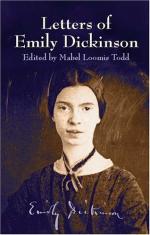|
This section contains 4,327 words (approx. 15 pages at 300 words per page) |

|
SOURCE: "Queen of Calvary: Spirituality in Emily Dickinson," in University of Dayton Review, Vol. 19, No. 1, Winter, 1987-1988, pp. 49-60.
In the following essay, Bishop asserts that the spirituality so central to Dickinson 's poetry is characterized by the poet's dismissal of contemporary religious dogma as well as by her decision, "based on Self-Reliance," to envision her own version of God and heaven.
Many books and essays on Emily Dickinson's poetry have appeared in the last five years, and each approaches the question of spirituality divergently depending on the author's dominant focus. Barbara Mossberg deals with Dickinson as dutiful and rebellious daughter; Jane Eberwein concentrates on strategies of limitation; Sandra Gilbert rehabilitates domesticity; and Vivian R. Pollak analyzes the anxiety of gender. The critics agree, however, that spirituality holds a central place in Dickinson's poetry.
Charles Anderson concludes his essay. "Grief." in Harold Bloom's 1985 collection on Dickinson by saying...
|
This section contains 4,327 words (approx. 15 pages at 300 words per page) |

|


